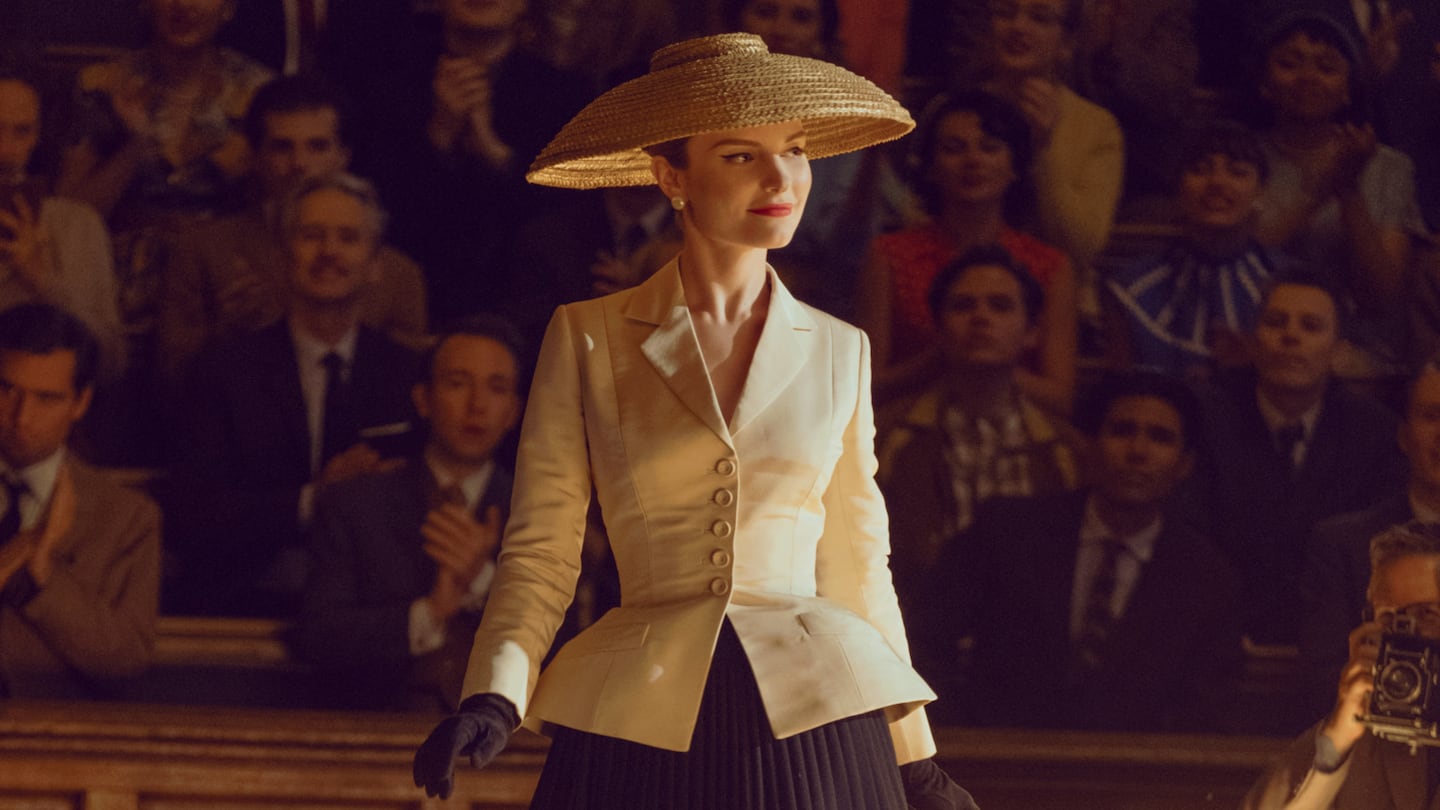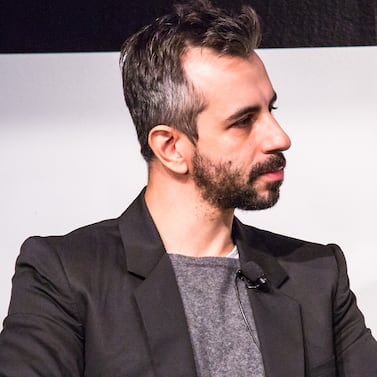
Agenda-setting intelligence, analysis and advice for the global fashion community.

Agenda-setting intelligence, analysis and advice for the global fashion community.

Last week, when LVMH announced the launch of 22 Montaigne Entertainment, a central platform to connect its 75 maisons with the entertainment industry, the move was about more than trying to capitalise on audiences eager to watch stories about brands from Barbie to Nike.
It was also a survival plan for a world where traditional forms of mass-media advertising are losing their effectiveness.
“Most people now consume their entertainment through various streaming services, and a lot of people, particularly the more affluent people, pay to not have their entertainment interrupted by advertising,” said Anish Melwani, chief executive of LVMH North America. “Of course we’re going to continue with our campaigns and things like that. But it increases the importance of having these amazing stories that are part of the heritage of our brands.”
Viewers are as hungry as ever for entertainment, but how they consume it is changing. Fashion is part of the stream of content they’re gobbling up alongside — and often in connection with — music, art and sport, a state of affairs Louis Vuitton underscored with its appointment of musician Pharrell Williams as men’s artistic director. Some of the industry’s biggest players are now creating more formal ties to the entertainment business. Last April, Saint Laurent announced a film production unit, while in September, Artémis, the holding company of Kering owner François Pinault, bought a majority stake in Hollywood talent agency CAA.
ADVERTISEMENT
LVMH has been working with studios for years, resulting in projects from the 2014 documentary “Dior and I” to the new Apple TV series “The New Look,” for which Dior provided clothing. But the entertainment industry often didn’t know how to get in touch with LVMH’s maisons, or in some cases that they even were part of LVMH, Melwani said. While the initiative is not actually a new division in the company, what it’s meant to do is create a single point of contact to facilitate these relationships, though approval of any project still lies with LVMH’s individual brands.
For assistance, LVMH has partnered with Superconnector Studios, whose stated mission is to help brands and entertainment “both find new ways to reach consumers and drive revenue in a world where ads have never been less popular.” Its founders are former CAA agent and producer John Kaplan and advertising veteran Jae Goodman, who previously worked with Nike to build Waffle Iron Entertainment, a venture that has yielded sports documentaries and a multiyear deal with Apple that includes three scripted projects.
“Everybody dumped their brand advertising into lower-funnel performance marketing,” Goodman said. “It didn’t really work just going direct-to-consumer on the brand side … We saw these two industries looking at each other saying, ‘It’s very clear we need each other.’”
The challenge for both is to create engaging stories that don’t feel like an ad but bring the benefits of one.
While social media made it easier for brands to connect directly with customers, rather than having to rely on magazines and television to convey much of their messaging, the returns have diminished over the years. Customer-acquisition costs have soared, privacy measures have made it harder to target the right audiences and consumers inundated with ads are tuning out. A 2023 report by marketing data and analytics firm Kantar found 86 percent of viewers took actions to avoid ads across TV, streaming and online.
With that, many companies are putting a renewed emphasis on brand marketing that tries to build deeper emotional connections with consumers — and studies find audiences are more likely to react positively to branded content than traditional advertising. Entertainment offers another channel for this form of brand building, as Goodman and Kaplan see it.
It happens that Hollywood is looking for intellectual property to turn into movies or TV series, and the blockbuster success of last year’s “Barbie” movie further proved there’s commercial appeal in stories about consumer brands.
These projects don’t need to reach “Barbie” levels of success to be worthwhile for brands, however. Though Nike wasn’t behind its making, the 2023 movie “Air” about the company’s signing of Michael Jordan and the creation of its Air Jordan line generated a noticeable amount of buzz around the Nike brand and caused an uptick in its net promoter score, a measure of brand favourability, according to data from intelligence firm Morning Consult. ESPN’s 2020 documentary series “The Last Dance,” about Michael Jordan and the Chicago Bulls, similarly boosted sales of the Jordan 1.
ADVERTISEMENT
“You aren’t going to see jaw dropping [return on investment] in terms of long-term consumer metrics, but you will see positive movement,” said Joanna Piacenza, head of industry analysis at Morning Consult.
What these entertainment projects also offer is a way for brands to take IP that’s proved successful in one arena and monetise it in others, a strategy entertainment giants like Disney pioneered.
“The media companies have done a great job of developing original IP, putting it on the TV screen or in the movie theatre and then monetising it through theme parks, consumer products, video games, live events,” said John Harrison, media and entertainment leader at EY Americas. “This is almost the opposite of that, where you’ve got IP that’s already monetised through these other channels that consumers have great familiarity with, and then you’re building an original story around that IP.”
In LVMH’s case, most of its brands aren’t household names on the level of Nike or Barbie, which could potentially make it difficult to get audiences to tune in. Entertainment, however, offers a way to get audiences to care, and streaming platforms make it easier for smaller stories that appeal to a niche demographic to be able to find their viewers.
“There’s a huge opportunity for brands that are not as well known to leverage this kind of storytelling to boost brand awareness, especially if the content is compelling,” Piacenza said.
No matter how big or beloved a brand may be, there’s no guarantee audiences will enjoy the resulting product. “The New Look,” for instance, has earned just a 57-percent positive rating on review aggregator Rotten Tomatoes.
LVMH’s Melwani acknowledged there’s a level of risk in letting someone else tell a brand’s story. But luxury is in the business of storytelling, and while LVMH is expert in communicating its maisons’ stories through product, fashion shows and exhibitions, entertainment is not its métier, he said. It needs writers and directors for that. Besides, if a brand isn’t excited by the storytellers’ vision, it doesn’t have to participate.
Of course, even if the brand is on board, a good narrative usually demands conflict and tension, which means the brand’s origins may not always be depicted in the best light.
ADVERTISEMENT
“Brands need to be smart in terms of how they structure these production deals and whether there’s ultimately some veto [power],” Harrison said. But there is “a fine balance between giving your entertainment partners creative flexibility and also protecting what you’ve built in terms of brand value.”
“You also don’t want to turn off the creative types that you’re working with,” he added.
A giant like LVMH at least has the benefit of numerous brands with interesting backstories. Bernard Arnault has often been attracted to brands with a great history, noted luxury consultant Robert Burke. It’s not hard to imagine a project or series about Tiffany in the future, or perhaps Fendi or even champagne house Dom Pérignon.
“To then be able to offer that viewer the physical experience of the brand [through the product] is really powerful,” Burke said.
The entertainment industry looks to be interested in helping out.
“Our switchboard has lit up with every studio, every talent agency, every A-list production company and, in some cases, specific talent,” said Superconnector’s Kaplan.
The trick now is to tell the right stories.
Disclosure: LVMH is part of a group of investors who, together, hold a minority interest in The Business of Fashion. All investors have signed shareholders’ documentation guaranteeing BoF’s complete editorial independence.
Even amid financial pressure, in 2024, marketers should focus on the strength of their brand, not the number of clicks on their Instagram ads.
Capitalising on sport’s soaring commercial and cultural relevance is becoming a primary focus for fashion brands. Winning sports-marketing strategies today hinge on building long-term, collaborative partnerships with athletes and organisations that resonate with a brand’s target consumers, as experts in BoF’s latest case study explain.
Reactions were mixed to the brand's move to appoint a non-designer as men's creative director. But cultural strategies that stretch beyond fashion may be increasingly pivotal for brands at Vuitton's scale.

Marc Bain is Technology Correspondent at The Business of Fashion. He is based in New York and drives BoF’s coverage of technology and innovation, from start-ups to Big Tech.
Presidential nominees Kamala Harris and Donald Trump are expected to flood social media with ads targeting undecided voters, prompting brands to double down on alternative marketing channels in the lead up to holiday season.
The former Vogue editor and Amazon Fashion head, who has spent the past year at the helm of the WME-owned Art+Commerce, speaks to BoF about what drew her to the agency, the parallels between her previous roles and the state of the industry.
After a Taylor Swift-related surge in viewership and buzz last season, the NFL is partnering with New York-based Veronica Beard to capitalise on the fashion opportunity.
Retail media remains a reliable way to connect with consumers online. BoF explores how Zalando’s retail media unit is platforming its partners to achieve strategic brand goals at their annual marketing awards.